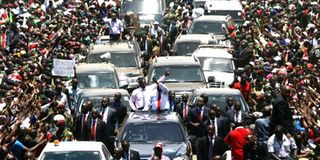Only ‘a people’ becomes ‘peoples’ in plural form

President Uhuru Kenyatta waves to his supporters at Muthurwa Market in downtown Nairobi on his arrival from The Hague on October 9, 2014.PHOTO | BILLY MUTAI |
What you need to know:
- In one meaning, the word people can be pluralised by adding an “s” to it.
- The inhabitants of Great Britain (Cornwall, England, Scotland and Wales) and of Lesser Britain (Ireland, Jersey and Man) used to have separate languages and cultures.
Why does anybody need to “restore sanity in counties”? According to the October 11 number of The Standard, the answer is: “For peoples’ sake”. By putting the apostrophe mark (’) after the “s”, the sub-editor betrays his ignorance of the fact that the word people has two distinct meanings.
In one meaning, the word people can be pluralised by adding an “s” to it. But, in another, it cannot. Here the word people refers to any plural number of human beings, any collectivity of ordinary persons, without such distinctions as class, ethnicity, gender, nation and rank.
How many people thronged the Jomo Kenyatta International Airport the other day to welcome their President home from a European visit? That question shows that, although the word people is singular in form, it is already plural in content and, therefore, does not require any “s” at the end.
Likewise, although you can ask how many people voted for Martha Karua in the General Election, you cannot ask how many peoples voted for her unless your intention is to analyse the voters in terms of tribe and race. In this case, the figure will be smaller than the number of fingers on my hand.
For the some 40 ethnic communities who compose Kenya can be categorised into a mere three or four races. And only less than a handful of our ethnic communities may be found in Ms Karua’s constituency. The point, however, is that the word people cannot be pluralised when it refers to any number of human beings.
It can be pluralised (by means of an “s”) only when it refers to an ethnic or racial community. The Kikuyu are one people. The Luhya are another people. The Luo are a third people. The Goans are a fourth people— and so on, until you include the Njemps: probably Kenya’s smallest ethnic people.
To reiterate, while Kenya is composed of some 50 million people (individuals), they can be analysed into some 40 peoples (namely, ethnicities and races). By the same token, the some 100 million people (individuals) who compose the United Kingdom can be categorised into several peoples (ethnic groups).
The inhabitants of Great Britain (Cornwall, England, Scotland and Wales) and of Lesser Britain (Ireland, Jersey and Man) used to have separate languages and cultures.
Indeed, the adjectives “Great” and “Lesser” refer only to their geographical sizes. “great” does not support the racial arrogance of those who colonised us once upon a time.
To summarise, whenever the word people is used to refer to any aggregation of human beings —whether only Robinson Crusoe and Man Friday or whether the whole halaiki at a political rally— it is already plural in significance. To give it an “s” — as The Standard sub-editor did— is to pluralise it twice.
But whenever the word people refers to an ethnic community, it is singular and needs to be preceded by the singular article “a”.
Only then can a plural number of such communities be referred to plurally as peoples.





